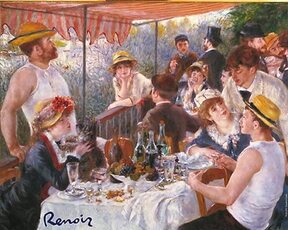 I am a devoted reader of the comic strips in the daily newspaper, turning to them before any other section. I enjoy the puns, gags, and all of that, but it is without any intent at humor when I declare that “I have to do my spiritual reading” as I open to the comics page. Many a strip has been thought provoking or has had spiritual value, whether or not the cartoonist intended it. My all-time favorite has been Peanuts. Recently a Peanuts strip came to mind in which Snoopy was greeting Woodstock with a huge hug while addressing him as his “friend of friends.”* It was clear that to Snoopy there was no one who he loved as much as the little bird who was his unlikely best friend, and that by the designation "friend of friends" what he really meant is ‘you are dearest to me, as a friend above all others.’ Charles Schultz may not have intended that particular strip to be spiritual, (though often he did), but thinking about it reminded me that Jesus had referred to His followers as His friends; He said, “I have called you friends because I have told you everything I have heard from my Father.” (John 15:15) Jesus told His disciples, (which includes us), that He desired to share the most intimate relationship He has, which is the one with His Father. And so He left His Holy Spirit, which is the love that unites the Father and the Son, so that we can enter into the very intimacy of God. Only a friend would invite a beloved one into such a relationship. It is astounding that the Lord of the Universe would call us ‘friend,’ and even more so that He would lay down His life for us in the greatest act of friendship. While we all have friends and may consider one person to be our best friend, we only have one who we can call our true ‘friend of friends' above all others: Jesus. However, this is true not so much because we have approached Him, but because He has called us first, inviting us into His friendship: “It is not you who chose me, but I who chose you and appointed you to go and bear fruit that will remain.” Jesus went even further by saying that if we accept the invitation to friendship with Him, anything we ask of the Father in His name will be given us. He then commanded: “Love one another.”** (John 15:11-17) No one can enter into such an intimacy, (that is, to enter into the love between the Father and the Son), without such a call. However, although God calls everyone into this intimacy, only some respond.  In His discourse Jesus revealed that friendship is a specific act of love connected to the love of God which He left the Church in the Person of the Holy Spirit. He said He calls us friends, but notice that He began and ended the passage by saying “Love one another.” (John 15:12,17) If anything is repeated it means that it is especially important; therefore, He may have emphasized it to indicate the effects of love. In other words, love is more than a feeling and it is even more than a commitment. It is both a gift from God and a gift of being in God. To love a stranger, (who is a neighbor we do not already know, but is regarded as a friend), as well as to love those we already know, is act of intimacy with God. This love is given through the gift of the Holy Spirit, thus it is from God. And Jesus repeats in various contexts in all four gospels that we are to “love our neighbor,” (including our enemies), and to “love one another,” building up to the most specific description: “Love one another as I have loved you.” In loving as He loves, we are also entering into the life of God; thus, it is a gift of being in God as He invites us into relationship with Him as a friend of friends, while inviting us to find Him in our other loves as well. The only way we can do this is to actually enter into the life of the Spirit who we were given as a Church at Pentecost and Who we are continually given at each of our 'personal Pentecosts,’ that is, with every Sacrament! 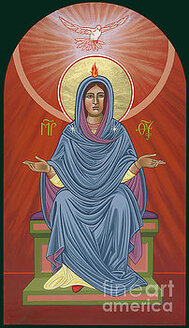 The feasts of Pentecost and of Trinity Sunday provide invitations to reflect upon the call we are given to enter into the life of the Triune God. We are called as friends to come into the very love which unites the Father, Son, and Holy Spirit into One. We are invited to seek the intimacy with God not only in the Sacraments and in prayer, but in our relationships with other people. We are called to reflect upon how we regard the Holy Spirit who binds us to the Father and the Son, and we are called to reflect upon how we regard other people. It is far easier to accept the invitation to find God in our private prayer and the Sacraments, than it is to put it into practice with others on a daily basis. This is why we need to ask God during our prayer to give us eyes and ears to see and hear as He does, and to give us a heart to love the way He does. Then, as we grow in friendship with God, we will grow in love for others.  May we accept the invitation into God’s friendship, regarding Jesus as our Friend of Friends! May we seek Him in those who we already regard as friends as well as in those friends we have yet to meet! And may we enter into the Love which unites the Father and the Son! Let us meet in the ‘heart’ of the Holy Trinity! Peace! ©Michele L. Catanese *This is the comic panel I am referring to, though the original was part of an entire strip: https://www.pinterest.com/pin/682999099712229836/ ** The word ‘commanded’ does not refer to something demanding, as it seems to indicate, especially since one who loves does not command a loved one to do anything; to command in that sense is contradictory to loving. Here, Jesus was simply emphasizing the importance of love. Images: 1. Painting, Luncheon of the Boating Party by Pierre August Renoir, 1881. Here is a link for more: https://commons.wikimedia.org/wiki/File:Pierre-Auguste_Renoir_-_Le_D%C3%A9jeuner_des_canotiers.jpg 2. Icon, The Holy Trinity by St. Andrei Rublev. 3. My photo, taken in Scotland. Perhaps a gathering of friends, the sheep of His flock. 4. Icon, The Blessed Virgin Mary, Mother of the Church, by Fr. William Hart McNichols. You can find it at https://fineartamerica.com/featured/the-blessed-virgin-mary-mother-of-the-church-william-hart-mcnichols.html 5. My photo, taken in Puerto Rico. I was thinking of Jesus as the Living Water of Love. Note: In compliance with GDPR rules, I wish to make it clear that I do not gather any information on any of my readers at any time.  On the Sundays of these past few weeks I have woken up with a sense of excitement, even joy, as I have prepared to go to church for Mass. I am definitely not a morning person, so getting up extra early is something that would not ordinarily lend itself to excitement. Lately, however, I find that I am so excited that it is palpable. Mass is an invitation to be fed in the Word and the Eucharist, and it is a way to express gratitude through worship; perhaps this is why I have always felt ‘at home’ there. But because the past year required protection from contagious illness, as a safety precaution going to Mass in person was not feasible. Having attended Mass for as long as I can remember, it felt strange to be in my living room instead of in the actual church. Worse still, not having access to the Eucharist was spiritually painful. When we were finally able to safely return to ‘in-person’ worship, the realization of what a great gift it is to be with the community has been heightened. This unexpected joy has reminded me how community, worship, Word, and Eucharist offer gifts which enable us to transcend the daily grind of our burdens, sufferings, difficulties, and even isolation. Furthermore, it is not a momentary transcendence because these gifts help us to grow in all that leads us closer to God. 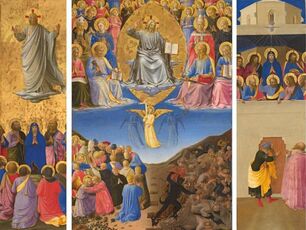 This week we celebrate the Ascension of the Lord, one of the most important feasts on the liturgical calendar.* It marks the completion of the redeeming work of Jesus Christ: He died, rose, stayed with the disciples for 40 days, (a number which signifies completion), and then ascended into Heaven in order that the Holy Spirit would come to usher in, and subsequently guide, the new Church. This event is also about the power given through grace and the Sacraments to rise above all that which conspires to weigh us down. The Ascension of Jesus is not to be understood as the time when Jesus left as if to ‘make room’ for the Spirit. (Remember, Jesus is with us until the end of time, as He promised.)** Rather, the celebration calls us to reflect upon the gift of salvation, but also to consider that which we need to rise above and which is in need of the faith, hope, and love that will lead us higher, so to speak, in holiness.  Two problematic temptations that work against our growth in holiness are our propensity for assumption and our expectations. Assumptions are generally things we presume without all the information needed. Not all assuming is a bad thing, but it becomes divisive if we presume to have knowledge that we do not concerning other people or situations and it can lead to dispositions of hubris and exclusivity. Expectations are what we want to happen, either concerning the behaviors and choices of another, (especially in our relationships with them), or in what we desire to be the outcome of a particular situation. The main problem with these two interior stances is that both are focused on the self and not on the other, (including God). In assuming, we rely upon our own ‘wisdom,’ insights, and judgement concerning the fullness of a situation. With expectations, it is our own desires and outcomes which we seek and into which we place all of our confidence. When the outcome of these expectations is not as we have desired, we become angry, and even blame God.  On this celebration of the Ascension of the Lord it would be good to reflect upon those areas of our lives which are in need of transcendence. We can take the temptations to which we are bound, to assume, to form the expectations to which we cling, and whatever keeps us from trusting in the Lord completely, and ask Him to help us rise above them. As we do, we will find joy and renewed spiritual life which in turn can move us to become truly excited to share in the many gifts God offers as we gather with our brothers and sisters in worship together. Indeed, we will find a greater freedom flowing from ascending above all that holds us from holiness, opening our heart and offering our will to the One who loves us more than we can fathom. 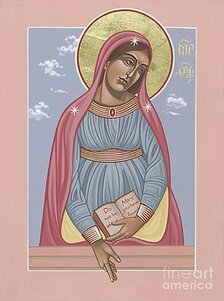 The Ascension of Jesus teaches that the grace of God can enable us to transcend assumptions and instead seek truth through the gift of faith. The Truth is found in the gospel of Jesus through which we are offered life to the full, that is, eternal life (John 10:10); we are offered the gifts of the Holy Spirit; we are offered a deeper experience of the love of God; we are offered membership in the community of believers, our brothers and sisters in the Body of Christ; we are offered faith as well as every manor of grace which helps us transcend the weight of life’s burdens. The Ascension also teaches us to rise above expectations through the gift of hope. To hope is to actively await that which we believe through faith; it is to open ourselves to the will of God and His wisdom. In short, the Ascension invites us to an interior shift, to ‘up-grade’ our assumptions and expectations to the gifts of faith and hope which are bound together through Love. It is Love which leads us from assumptions to faith and from expectations to hope, and through faith, hope, and love, we are moved to gratitude and joy.*** 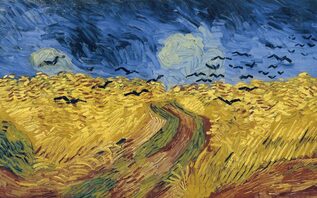 May we embrace the freedom and joy which comes from ascending above our assumptions and expectations! May we trust in the Loving guidance of the Holy Spirit! May we open ourselves to the gifts offered in worship with the community! And may we grow in gratitude for all that is offered to us by the Risen and Ascended Lord! Let us meet in the Heart of Jesus! Peace! ©Michele L. Catanese * Some dioceses celebrate the Ascension on Thursday of the 6th week of Easter and others commute it to the following Sunday, the 7th Sunday of the Easter season. ** This was a promise made by Jesus in the final words of Matthew’s gospel, Mt 28:20. *** It is important to understand that joy is not the same as happiness or good feeling, although both of these can be present within joy. Joy is a spiritual gift that is so prominent when experienced that it goes beyond just the feeling; it permeates everything. It is God’s very presence somehow made manifest within us. Indeed it is the presence of the Holy Spirit. Images: 1. My photo, taken in Dingle, Ireland. The colorful houses and the playful dolphins speak of community and of joy. 2. Painting, The Ascension of the Lord, part of a triptych by Blessed Fra Angelico. 3. My photo, taken on the road to Mt. Cook in New Zealand, (south island). These mountains, with the optical illusion of the road being 'swallowed up' by them, are not only humbling, but remind us that all is not always as it appears. 4. My photo, also taken in New Zealand, (north island). The rushing water reminded me of the movements of the Holy Spirit, leading us to greater freedom. 5. Icon, Mother of Holy Hope, by Fr. William Hart McNichols. Mary, visibly pregnant in this icon, said 'Yes' to the will of God, laying all her expectations at His feet. She never wavered in her hope in God's promises. It can be found at fineartamerica.com/featured/mother-of-holy-hope-263-william-hart-mcnichols.html 6. Painting, Wheatfield with Crows, by Vincent van Gogh, 1890. This is thought to be van Gogh's last painting. It spoke to me of freedom as we see the crows rising into the sky on the wind. Note: In compliance with GDPR rules, I wish to make it clear that I do not gather any information on any of my readers at any time. 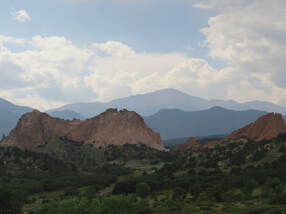 When I am a passenger in a car during a road trip I enjoy looking out the window at the passing countryside. I generally become silent because there truly is much to notice or to inspire thought. On a recent road trip I noticed a billboard which read: “Purpose found in the Marine Corps.” This sign got me thinking about what it means to have a sense of purpose and how important it is to consider, not just once, but throughout our lives. For some, finding purpose can seem elusive, but that may be because we are looking for it in the world rather than where it is actually found. Our true purpose is found in our relationship with God in whom “we live and move and have our being.” (Acts 17:28) In the Spiritual Exercises St. Ignatius of Loyola says that our purpose is to know, love, and serve the Lord. He said this because he knew from experience that all earthy occupations and commitments have an everlasting purpose if they are rooted in Jesus Christ and thus, they provide joy. If not, he discovered, our pursuits are empty and lead to a sense of unrest and unhappiness. But with Christ we have hope; and if we realize our lives are about discipleship, and pray for discernment in how to live it daily, then everything we do has a purpose. In short, recognizing God’s great love for us, responding to it, and sharing it with others is the purpose of every Child of God. 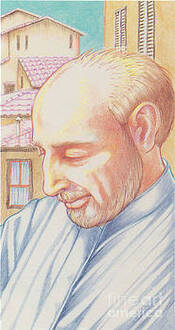 When our purpose is rooted in God, it is rooted in the mercy and love which builds up the Kingdom. Our world is in much need, and even our smallest efforts to live the gospel have lasting effects whether we see ‘results’ or not. When our lives are rooted in Christ everything we do is in service to Him and therefore it is indeed a holy work. St. Ignatius describes our purpose like this: “Human persons are created to praise, reverence, and serve God the Lord and by this means attain salvation. The other things of this earth are created for us, to help us in attaining the purpose for which we are created….” * In short, everything we have, (including our unique giftedness), and everything we do should be oriented toward coming to better know, love, and serve the Lord. In this end we will find our greatest joy, even when the path involves suffering along the way. 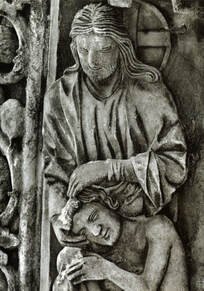 It is important to recognize that our purpose is more about who we are and less about what we do. What we do will express our identity in Christ; that is, our identity is about acknowledging and accepting His love and then responding to it. In other words, who we are will affect what we do. There are two important facets of our identity which will affect our sense of purpose. First, we are God’s children, made for His love. That is, the creative act, the gift of life, is a result of God’s love, which is why life is so sacred: in the beginning God lovingly breathed His own breath into Adam and Eve, creating them with His own hands. (Genesis 2) Forever after, God has wanted to develop a relationship with each of His children because it is His very nature. He is Love; although He chooses to do so, it is simply impossible for Him not to love us. Thus, He wants us to know Him intimately as He knows us. It is through spending time with Him in prayer, as well as in our daily attentiveness, that we come to grow in awareness of His presence and in who He is. 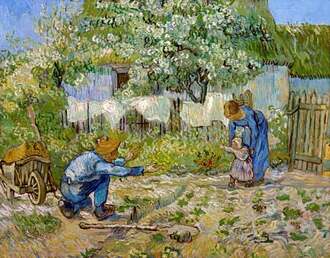 Second, we were made to love. God has oriented us to both receive and share love. Love is a choice, a commitment, which leads to action; it is not really love unless it is shared. We are made to offer this love through the actions of our daily lives that others would come to know the love of God, too. Love, therefore, is a form of evangelization, our lived expression of the gospel. Jesus taught in His words and deeds that the greatest love was in laying down our lives for others. ‘Laying down our lives’ means becoming more other-centered and less centered on our own comfort or wants; it means making sacrifices such as those parents continuously make for their children. It can mean working for justice, feeding and clothing the poor, welcoming the stranger, providing services for those lacking them, offering our time, talent, or treasure to help others as needs arise. It means responding in mercy, forgiveness, and care, especially to those who challenge us or are difficult to be with. And it means spending time in adoration, worship, and all forms of prayer in order to immerse ourselves in God’s presence, to be immersed in Love, so that we can discern how we need to grow in our response and way of proceeding in daily life.  St. Thérèse of Lisieux wrote that her vocation was love.** Indeed, our purpose is to be love as we share the love of Christ with others. This is the call of the gospel message of Jesus. Love is the purpose from which we spring, of which we eat (in the Eucharist), and it is the purpose for which we are intended to return when we arrive in Heaven. No matter what happens in our lives, we are held fast by Love. And if we cling to Jesus in turn, we will find, along with faith and hope, the love that moves mountains. May we discern through prayer how to better know, love, and serve the Lord! May we know the Love of God more clearly every day so that we might respond to others in love, too! And may we find joy in following Jesus, the one who is Love! Let us meet in the Heart of Jesus! Peace! ©Michele L. Catanese *The Spiritual Exercises of St. Ignatius Loyola, translated by Elisabeth Meier Tetlow; this is a portion of the Principle and Foundation, (paragraph 23 of the Exercises). ** Story of a Soul: The Autobiography of St. Thérèse of Lisieux, page 194, third edition, translated by John Clarke, O.C.D. Images: 1. My photo, Rocky Mountains in Colorado. 2. Drawing, St. Ignatius at Prayer in Rome, by Fr. William Hart McNichols. If you are interested in this image for purchase in one of many mediums, it can be found at https://fineartamerica.com/featured/st-ignatius-at-prayer-in-rome-william-hart-mcnichols.html 3. Black and white drawing of the sculpture, The Creation of Adam, found at Chartres Cathedral in Chartres, France. 4. Painting, First Steps (after Millet), Vincent van Gogh, 1890. 5. Photo, St. Thérèse of Lisieux taken at her convent. Note: In compliance with GDPR rules, I wish to make it clear that I do not gather any information on any of my readers at any time. |
Heart Speaks to Heart
|

 RSS Feed
RSS Feed

